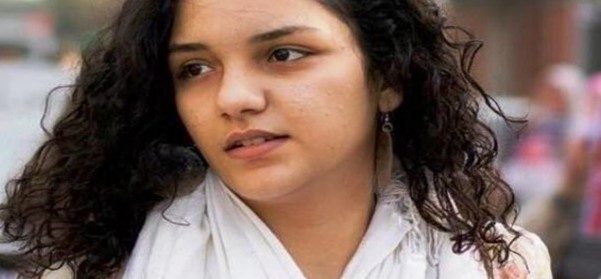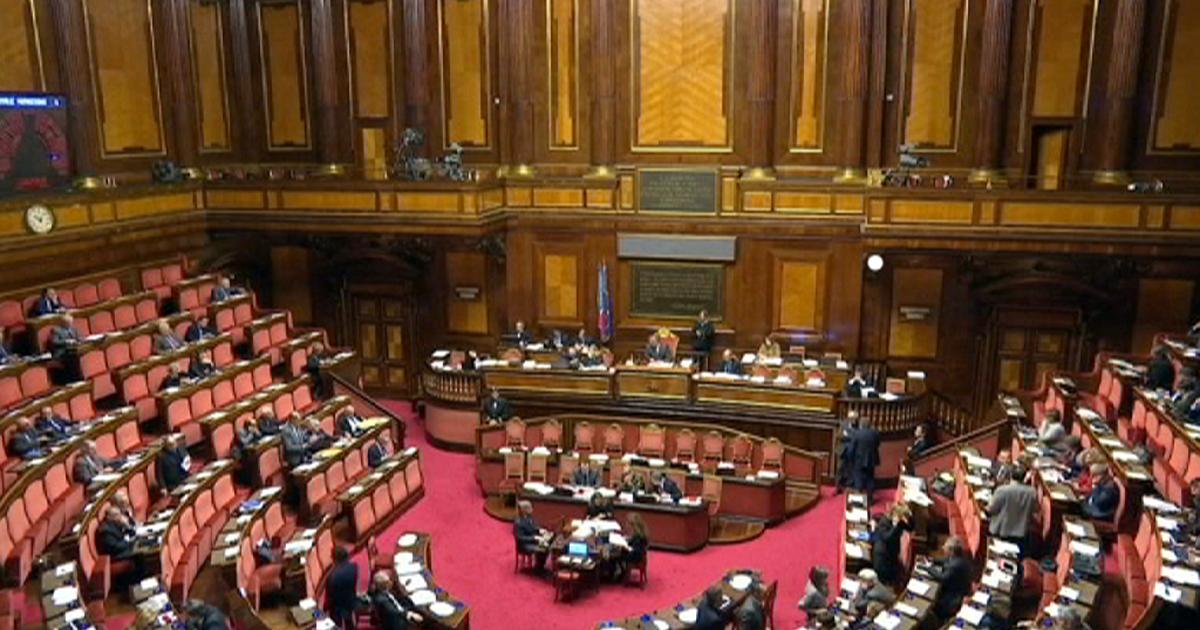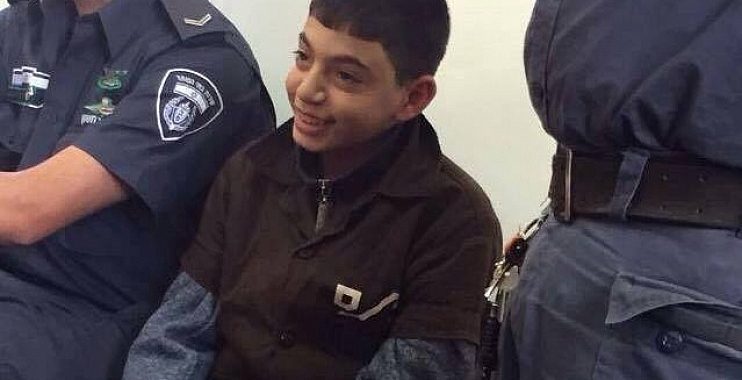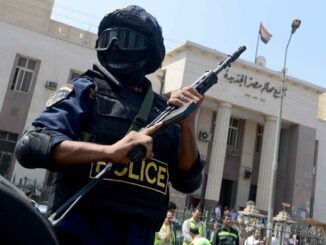
Sanaa Seif’s brother Alaa Abdel Fattah was sentenced earlier this week to five years in prison despite an international outcry
Egyptian authorities released the prominent activist Sanaa Seif on Thursday after serving a prison term of 18 months, her family announced.
Sanaa Seif, 28, a human rights advocate and film editor, was abducted outside the prosecutor-general’s office in Cairo on 23 June 2020. At the time, she was seeking to lodge an official complaint about being attacked the previous day while camping outside Tora prison, where her brother Alaa Abdel Fattah is being held.
After her arrest, she was held in pre-trial detention at the Qanater women’s prison and a court in March sentenced her to one and half years of jail time on charges of “spreading false news related to the Covid-19 pandemic” and “using a Facebook account to terrorize people”.
Her release is rare, good news for the Seif family. On Monday, a court sentenced her brother Alaa Abdel Fattah, a left-wing political activist, to five years in prison, prompting condemnations from rights groups and governments worldwide.
Seif’s sister Mona tweeted the news of her release and published a photo of them walking together in a Cairo street, writing: “Sanaa on the asphalt,” a term used by Egyptians to refer to being recently freed from unjust detention.
Mona tweeted earlier that the family had to go through a strict procedure at a police station to finalize Sanaa’s release papers.
Since President Abdel Fattah el-Sisi came to power following a 2013 coup, Seif had been detained on two other occasions.
She was first detained from June 2014 to September 2015 for taking part in “unlawful protests”, and was held for another six months in 2016 on charges of “insulting the judiciary”.
Seif and her family have been among the most well-known Arab Spring activists in Egypt since the revolution that ousted longtime autocrat Hosni Mubarak in 2011.
Her arrest in 2020 has been denounced by dozens of international public figures, including Hollywood actors Danny Glover, Maggie Gyllenhaal and Thandie Newton, who signed a joint statement in August calling on Egypt to release her.
A symbol of the Jan. revolution
Sanaa Seif was 17-years-old when the revolution burst onto the streets of Egypt in 2011. She was not really experienced with being in large gatherings or demonstrations, but she was soon to become, to many Egyptians, a symbol of resistance and revolutionary spirit.
“I’ve known Sanaa since 2012 and I quickly noticed her energy and her kindness when dealing with people. She belongs to what I call the pure revolutionary generation,” says Egyptian artist Ammar Abo Bakr. “She is one of the best examples of a true Egyptian revolutionary.”
Sanaa is the daughter of a prominent human rights lawyer and activist Ahmed Abo Seif, who died in August, and she belongs to a famous and very politically active family.
Her father defended human rights, workers and political activists and was the founder of the Hisham Mubarak Law Center, which provides legal assistance for those who can’t afford to pay for their legal fees.
Sanaa’s mother, Laila Soueif, is a professor at Cairo University and a leader of the 9 March Movement that promotes academic freedom in Egypt. Alaa Abdel Fattah and Mona, Sanaa’s brother and sister, are also well known within the Egyptian activists network.
But the family’s activism, which resulted in Abo Seif and Alaa being imprisoned on several occasions, was one of the reasons why, growing up, Sanaa did not take part in demonstrations. She did not want to follow her parents’ lead, at least not at first, and it seems Sanaa does not consider the family activism per se what pushed her to take to the streets.
The first major protest she attended was a rally on behalf of Khaled Said, a young Egyptian who was brutally beaten to death by policemen in Alexandria in June 2010. Sanaa’s involvement in activism stemmed primarily from there, and she then developed a keen interest in the poor living conditions of her fellow countrymen. As with many other young Egyptians, she wholly embraced the spirit of the January 2011 revolution.
Sanaa was arrested on 21 June 2014 along with 22 other people for taking part in a demonstration against the controversial protest law that came into force at the end of 2013 and bans public protests that take place without police notification. In October, Sanaa and the other defendants were sentenced to three years in jail.
In the past four years Sanaa’s face, more than her family name, has become a symbol to revolutionaries who were part of the Tahrir Square protests in Cairo. Her endless groundwork during and after the revolution gave her the respect and the gratitude of the people.
Abo Bakr recalls how she was “always busy helping people, giving them food or water, or assisting them in jail”. While her mother, Laila Soueif, told the Egyptian newspaper Mada Masr how Sanaa used to carry people shot by the army and the police to the hospitals, looking for any friend with money or a car who could help her.
Her beauty, youth and strong character, associated with the hardship that she and the other prisoners are facing, exemplifies to Abo Bakr the deterioration of human rights and freedoms in Egypt.
“This is not a piece of art,” he said of his mural, “This is a message to the people. It is to remind them how awful the situation in Egypt is right now,” Abou Bakr said after he applied his first few brush strokes to the wall.
Moving frenetically on a six-meter-long and four-meter-high wall, Abo Bakr moved up and down the length of the painting on a small and unstable scaffold, regularly shifting his eyes back to the black and white picture of Sanaa printed on several sheets of paper scattered on the ground.
“The picture was taken on a train by a mutual friend, and it has been chosen by the ‘Free Sanaa’ movement,” says Abo Bakr. “What I want is to give my contribution to this movement because Sanaa is a friend and we have to explain, through her experience, what happens to other Egyptians.”
Hundreds of people around the world have shared their pictures on the Free Sanna Facebook page, showing themselves with a stylized image of Sanaa above the written tags #FreeSanaa and #NoProtestLaw.
Before she was arrested, Sanaa worked in an independent newspaper she created with her friends, and which aimed to give a voice to the people. She also developed a keen interest in film-making and contributed as documentary editor to the Oscar-nominated movie The Square.
On 21 June this year, Sanaa held a protest in front of the presidential palace demanding that the government release all political prisoners, including her brother Alaa, and remove the protest law. “The rally point was next to the Ahram metro station in Heliopolis, just a few streets from the presidential palace, but the march only lasted a few minutes before the police decided to severely crack down on it,” says Egyptian activist Mohanad el-Sangary who took part in the protest.
“We were attacked after just 15 minutes by security forces, plain-clothes policemen and pro-government thugs, labelled by the state as honorable citizens, and they started arresting people randomly, looking for any suspect close to the area.”
Sanaa’s lawyer, Taher Abou el-Nasr, said all the arrested protesters have been charged with several crimes, including organizing an unauthorized protest, damaging public and private properties, show of force and use of weapons.
Sanaa has spent almost six months in el-Qanater female prison. On 28 June, according to her lawyer, Sanaa began a hunger strike, which was only interrupted more than three months later as a result of the deterioration of her health.
According to Nasr, Sanaa is always asking about the conditions of the other prisoners and helps them as much as she can. “Even when all 23 were sentenced to three years in jail, she did not give up hope and the detainees now look at her as a leader because she truly believes in justice and freedom,” he said.
However, Sanaa Seif was finally released on 23 December 2021 after 18 months in prison, which is a good news. https://googleads.g.doubleclick.net/pagead/ads?client=ca-pub-6114695881218027&output=html&h=250&slotname=9954860777&adk=2349951408&adf=1123687128&pi=t.ma~as.9954860777&w=300&lmt=1640279670&psa=1&format=300×250&url=https%3A%2F%2Fwww.middleeasteye.net%2Fnews%2Fegypt-activist-sanaa-seif-released-prison&flash=0&wgl=1&uach=WyJXaW5kb3dzIiwiMTAuMC4wIiwieDg2IiwiIiwiOTYuMC40NjY0LjExMCIsW10sbnVsbCxudWxsLCI2NCJd&dt=1640280350444&bpp=3&bdt=533&idt=353&shv=r20211207&mjsv=m202112060101&ptt=9&saldr=aa&abxe=1&prev_fmts=771×90%2C0x0%2C600x100&nras=1&correlator=8255513448676&frm=20&pv=1&ga_vid=925608293.1640280351&ga_sid=1640280351&ga_hid=1084814107&ga_fc=1&u_tz=180&u_his=12&u_h=768&u_w=1366&u_ah=728&u_aw=1366&u_cd=24&u_sd=1.75&dmc=4&adx=38&ady=3052&biw=771&bih=357&scr_x=0&scr_y=1626&eid=44750773%2C21067496&oid=2&psts=AGkb-H9mTwCJVOnXa57axmBGLS5UtZPtFk8KB6zglA1g6gsMjZzba_1eJflZsVk8r0gx2mEc40IYhoINxA&pvsid=2642955634371935&pem=420&tmod=253&ref=https%3A%2F%2Fwww.middleeasteye.net%2Fnews&eae=0&fc=896&brdim=0%2C0%2C0%2C0%2C1366%2C0%2C1366%2C728%2C780%2C357&vis=1&rsz=%7C%7CeEbr%7C&abl=CS&pfx=0&fu=1024&bc=31&ifi=3&uci=a!3&btvi=2&fsb=1&xpc=1OWpw5Q9zv&p=https%3A//www.middleeasteye.net&dtd=6208



